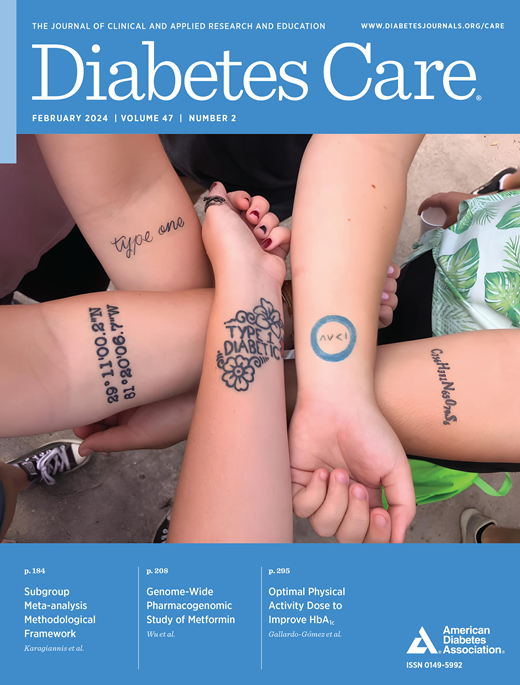Reimagining Acute Diabetes Care: Insights From the Victorian Virtual Emergency Department
IF 16.6
1区 医学
Q1 ENDOCRINOLOGY & METABOLISM
引用次数: 0
Abstract
OBJECTIVE New approaches to diabetes care are needed to better identify and manage diabetes emergencies outside of hospitals. RESEARCH DESIGN AND METHODS A descriptive analysis of routinely collected data was conducted using data from the Victorian Virtual Emergency Department (VVED) Diabetes, a telehealth service that provides emergency care, including ketone testing by ambulance personnel, for patients across Victoria, Australia, experiencing non–life-threatening diabetes-related emergencies. RESULTS Between July and December 2024, VVED Diabetes managed 868 diabetes-related emergencies, with 82.5% treated in the community, avoiding a physical emergency department visit. Referrals came from various sources, including Ambulance Victoria (26%), aged care facilities (29%), and self-registrations (20%). Hyperglycemia accounted for 46% of presentations. No clinical adverse events were reported, and patients gave positive feedback in a postdischarge survey. CONCLUSIONS VVED Diabetes delivers safe, timely, and high-quality treatment for individuals with diabetes who are acutely unwell, while ensuring the efficient use of limited hospital resources.重新想象急性糖尿病护理:来自维多利亚虚拟急诊科的见解
目的:需要新的糖尿病护理方法来更好地识别和管理医院外的糖尿病急诊。研究设计和方法使用来自维多利亚虚拟急诊科(VVED)糖尿病的数据,对常规收集的数据进行描述性分析,该远程医疗服务为澳大利亚维多利亚州经历非危及生命的糖尿病相关紧急情况的患者提供紧急护理,包括救护车人员的酮检测。结果:在2024年7月至12月期间,VVED Diabetes管理了868例糖尿病相关急诊,其中82.5%在社区治疗,避免了物理急诊科就诊。转诊来自各种来源,包括维多利亚救护车(26%)、老年护理机构(29%)和自我登记(20%)。高血糖占46%。无临床不良事件报告,患者在出院后调查中给予积极反馈。结论:VVED Diabetes为急性不适的糖尿病患者提供了安全、及时、高质量的治疗,同时确保了有限医院资源的有效利用。
本文章由计算机程序翻译,如有差异,请以英文原文为准。
求助全文
约1分钟内获得全文
求助全文
来源期刊

Diabetes Care
医学-内分泌学与代谢
CiteScore
27.80
自引率
4.90%
发文量
449
审稿时长
1 months
期刊介绍:
The journal's overarching mission can be captured by the simple word "Care," reflecting its commitment to enhancing patient well-being. Diabetes Care aims to support better patient care by addressing the comprehensive needs of healthcare professionals dedicated to managing diabetes.
Diabetes Care serves as a valuable resource for healthcare practitioners, aiming to advance knowledge, foster research, and improve diabetes management. The journal publishes original research across various categories, including Clinical Care, Education, Nutrition, Psychosocial Research, Epidemiology, Health Services Research, Emerging Treatments and Technologies, Pathophysiology, Complications, and Cardiovascular and Metabolic Risk. Additionally, Diabetes Care features ADA statements, consensus reports, review articles, letters to the editor, and health/medical news, appealing to a diverse audience of physicians, researchers, psychologists, educators, and other healthcare professionals.
 求助内容:
求助内容: 应助结果提醒方式:
应助结果提醒方式:


